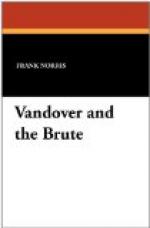“Why, how do you do, Mr. Vandover?” exclaimed Toby. “Haven’t seen you round here for some time.” Vandover was about to answer when the other interrupted:
“Well, what’s happened to you? Look as though you’d been drawn through hell backward and beaten with a cat!”
In fact Vandover’s appearance was extraordinary. His hat was torn and broken, and his clothes, stained with tar and dirt, shrunken and wrinkled by sea-water. His shoes were fastened with bits of tarred rope; he was wearing a red flannel shirt with bone buttons which the boatkeeper on the pilot boat had given him, tied at the neck with a purple handkerchief of pongee silk; his hair was long, and a week’s growth of beard was upon his lip and cheeks.
“That’s a fact,” he answered grimly. “I do look queer. I was in a wreck down the coast,” he added hastily.
“The Mazatlan!” exclaimed Toby. “That’s a fact; the papers have been full of it. That’s so, you were one of the survivors.”
“The survivors!” echoed Vandover with wondering curiosity. “Tell me—you know I haven’t heard a word yet—were there many lives lost?” He marvelled at the strangeness of the situation, that this bar waiter should know more of the wreck than he himself who had been upon it.
“You bet there were!” answered Toby. “Twenty-three altogether; one boat capsized; Kelly, ‘Bug’ Kelly, son of that fellow that runs the Crystal Grotto, he was drowned, and one of Hocheimer’s—Hocheimer, the jeweller, you know—one of his travelling salesmen was drowned; a little Jew named Brann, a diamond expert; he jumped overboard and—”
“Don’t!” said Vandover with a sharp gesture. “I saw him drown—it was sickening.”
“Were you in that boat?” exclaimed Toby. “Well, wait till I tell you; the authorities here are right after that first engineer with a sharp stick, and some of the passengers, too, for not taking him in. A woman in one of the other boats saw it all and gave the whole thing away. A thing like that is regular murder, you know.” Vandover shut his teeth against answering, and after a little Toby went on, willing to talk. “You know, we’ve got a new man for the day-work down here now—George isn’t here any more. No, he’s going to start a roadhouse out on the almshouse drive in a few months; swell place, you know. I’ll have him send you cards for the opening.”
Vandover ordered oysters, an omelette, and a pint of claret from the new waiter who did the day-work, and ate and drank the meal—the like of which he had not tasted since leaving Coronado—with delicious enjoyment.
He delayed over it long, taking a great pleasure in satisfying the demands of the animal in him. The wine made him heavy, warm, stupid; he felt calm, soothed, and perfectly contented, and had to struggle against a desire to go to sleep where he was. The atmosphere of the Imperial was warm and there was a tepid languor in the air as of the traces of many past debauches, a stale odour of sweetened whisky and of musk. After the roughness and hardships of the last week he felt a pleasant sense of quiet, of relaxation, of enervation. He even began to wish that Flossie would come in. This, however, made him rouse himself; he shook himself, and started home, paying his carfare with his last nickel.




